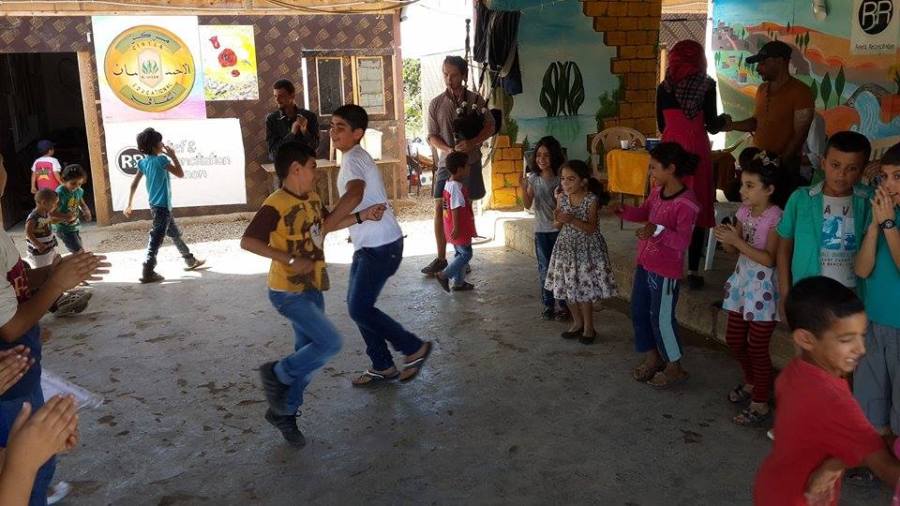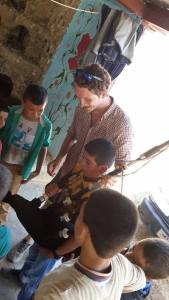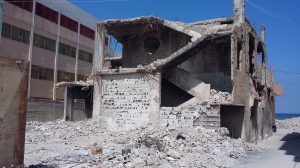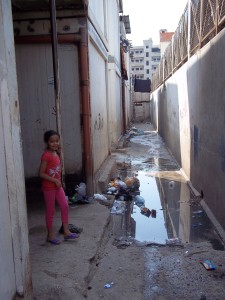The legend that is Melad Salameh took me on a quick tour of Beddawi camp the other day. This is the other Palestinian refugee camp in North Lebanon, in a suburb of the port city of Tripoli.

Having spent the last month in Nahr al Bared, making friends and feeling at home there, I expected it to be something similar, another variety of the relaxed, peaceful and extremely friendly atmosphere you get in al Bared. I planned to go alone, walk around, take some photos, maybe meet some people. When I told Melad this, I got a funny look and then he suggested it’s not the best idea, better he takes me by car.
Nahr al Bared camp lives its entire life behind Lebanese military checkpoints, despite all the downsides that entails, there are some big pluses- a sense of security being one of them. I asked Melad once if he or other residents resent the Lebanese military and their enclosure of the camp, I was being a bit facetious and expected the answer to be an emphatic ‘yes’. He surprised me by saying, ‘not at all, they protect us’. I thought that was a remarkable statement considering that same military had only 8 years previously flattened the entire camp, not to mention they were regularly engaged in the on-going detention of young men in the camp (one evening when I first arrived the military raided homes and detained 13 young men. This happens regularly and men can be taken and detained for weeks and months without so much as a formal charge) not to mention their track record of putting down protests violently, wounding and even killing protesters. Stupid me, this is a world I know precious little about, everything here is relative and everything belongs in context.
Beddawi camp’s recent history and it’s structure is nothing like al Bared. For starters it is densely populated like I have never seen before, there are people thronging the streets and all kinds of traffic and activity happening on balconies, on the streets, in shops. People everywhere. I’ve spent the last year in one of the largest cities in the world in one of the most densely populated parts of the world (Guangzhou, China) and even there I haven’t been to such overcrowded neighbourhoods. Apparently the population is around 30,000 though it’s very difficult to know how accurate that is. Palestinians in Lebanon aren’t allowed to own land so expanding the camp is very difficult, this and the high birth rate and influx of other refugees compounds the situation. Some residents have no ID or papers whatsoever and are not registered and also there are, like Nahr al Bared, thousands of Syrian-Palestinians from Palestinian refugee camps inside Syria, who have twice been made refugees who are sheltering there. While their own camp was being destroyed in 2007 many of the then 45,000 Nahr al Bared residents fled to Beddawi for shelter. Given the cramped nature of the camp it’s difficult to imagine how at any time thousands more could be welcomed. The Palestinians seemingly have an immense level of solidarity when it comes to caring for refugees and anyone else for that matter.


Unfortunately I couldn’t take too many photos around the camp. Beddawi is one area where there is an agreement for the Lebanese authorities not to enter so security is provided by Palestinian factions. Armed men guard the streets and are naturally weary about anyone taking photos of them. Tripoli itself is intensely sectarian and has been described as a microcosm of Lebanon’s wider sectarian conflicts. Beddawi borders a major Alawaite neighbourhood, Jabal al Mohsen and the Sunni area, Bab al-Tabbaneh.
Patrick Strickland sums up the situation well, “The Lebanese state is fighting Islamist militias, who oppose Syrian President Bashar al-Assad. Alawite armed groups, who support Assad in Syria, are fighting Islamist militias. Many of the Islamist militias are at odds with one another.”
And that’s without even factoring in the densely populated, quasi-autonomous Beddawi camp stuck in the middle of all this.
Almost every building you can see going through the different neighbourhoods is pock-marked with bullet-holes (that said, bullet-holes on buildings are everywhere in Lebanon, apparently these ones were from recent battles though..). Another friend had pointed out a now closed, Jabat al Nusra recruiting office when we passed the previous day. They are an Al Qaeda affiliated group, doing a lot of the fighting against the regime in Syria, among other things they also claimed responsibility for a car bomb in the city as ‘a revenge attack’ in the Alawite neighbourhood in January of this year. Alawites are broadly aligned with the Assad regime and al Nusra spear-head the former FSA, anti-regime forces (what Putin now wrongly refers to as ISIS).

Despite all this, friends of Melad who we met there, young people who now live in Kuwait say they love Beddawi and would rather stay than go back to Kuwait. In all it’s craziness and hardship, like Nahr al Bared they seem to have created a very tight community of family and friends. There is something special about these communities, so much of their lives is fun and lively and spontaneous. It’s normal to see 10 year olds driving cars or cutting about on scooters or to see someone riding a quad-bike down the road on two side-wheels or for someone to ride a horse through the streets. Sadly though the violence in these neighbourhoods is less spontaneous, often controlled and influenced from outside and in the case of the al-Nusra fighters in neighbouring Sunni streets, they “are just waiting for the order from Saudi Arabia to open the next battle”. And sadly, Palestinians and all the other residents remain stuck in the middle.
































